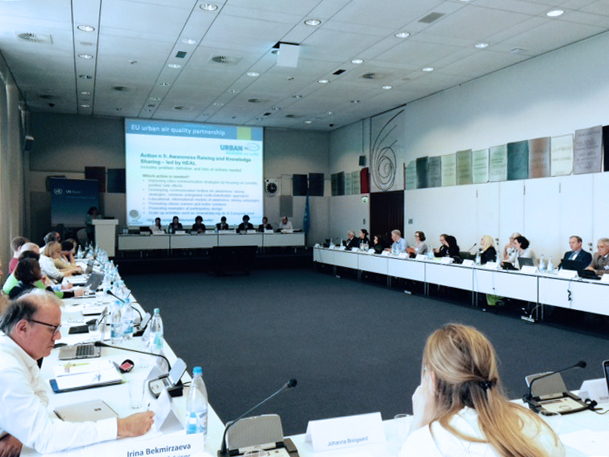
BONN (Germany). On May 16-17, the 21st joint meeting of the Joint Task Force on the Health Aspects of Air Pollution was held. This task force was established in 1998 within the Convention on Long-range Transboundary Air Pollution to assess the health effects of such pollution and to provide supporting documentation. The main objective of the Convention on Air Pollution and its Protocols is to protect human health and the environment from the negative effects of air pollution by limiting and gradually reducing of gas pollutants emission into the atmosphere. The convention does not define specific obligations related to emissions of atmospheric pollutants but requires the parties to develop and implement national programs, policies and strategies to combat air pollution.
Five Central Asian countries are located in the eastern part of the UNECE region and have been actively involved in the work of the convention in recent years. Kazakhstan and Kyrgyzstan have already acceded to the convention. Uzbekistan, Tajikistan and Turkmenistan are under consideration.
The meeting brought together representatives of the Parties to the Convention, as well as the experts. The meeting allowed an exchange of views on the progress made in research on the health effects of air pollution. Presentations showed that governments are increasing commitments to monitor and reduce air pollution, and more activities are being taken by the health sector and other sectors such as transport, housing, utilities and energy. Participants also had an opportunity to discuss the implementation of the work plan of the Task Force on Health in the period 2018-2019.
Ms Irina Bekmirzaeva, CAREC "Environment and Health" programme manager, made a presentation about the experience and current activities of the organization for improving air quality in Central Asia. This activity includes implementation of the research project of the United Nations Environment Programme and the Government of Kazakhstan "Sustainable reduction of emissions in the transport sector"; regional activities in collaboration with the UNECE secretariat and the Air Convention for the economic sectors of Central Asia: transport, environment and health. Ms Bekmirzaeva mentioned other large-scale initiatives of CAREC that contribute to the improvement of the environment, namely, the annual Central Asian International Environmental Forum and the launch of the "Environment for Central Asia" process in order to strengthen the "voice" of the region in the international arena.
In conclusion of the report, an appeal was made to all interested parties to expand cooperation with CAREC in assisting the countries of Central Asia in implementing international capacity building programmes. Existing CAREC platforms, such as meetings of regional organizations, parliamentarians and representatives of the Ministry of Foreign Affairs, are important for regional coordination, sectoral cooperation and political support for the implementation of international conventions, raising awareness, sharing experiences, lessons learned and best practices. Chairperson of the meeting, Ms Dorota Jarosinska, Manager of the WHO program "Living and Working Environments", thanked CAREC for cooperation and updating of information on air quality.
Upon the results of the meeting, it should be noted that environmental and health issues are becoming more and more important in politics in both the global and the European context. The activity of the environmental organizations is gaining recognition also in Central Asia. The "Environment and Health" programme is a "pioneer" in this direction and step by step will promote the need for concerted action to address environmental and health problems, raise the awareness of stakeholders and decision-makers, strengthen the synergy between conservation and health institutions. And, according to Ms Bekmirzayeva, the programme will also work on launching regional projects.
